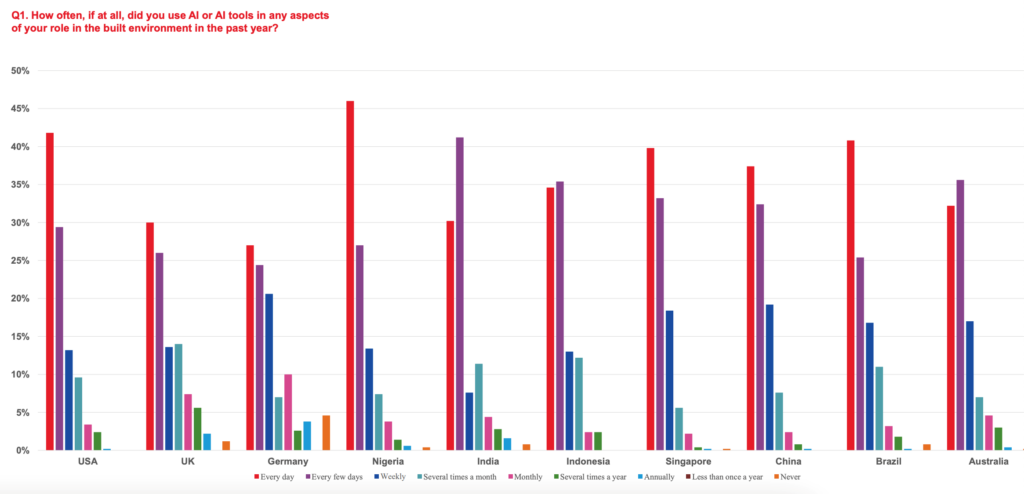|
Getting your Trinity Audio player ready...
|
Over 45% of Nigerian architects, city planners and engineers used artificial intelligence (AI) daily over the past year, the highest proportion among ten major economies globally, according to a new survey.
British design and engineering firm Arup surveyed 5,000 professionals in the built environment in ten countries on how AI has impacted their work, how they use it, and their future plans with the technology. The respondents were pooled from Nigeria, Australia, China, Brazil, India, Germany, Indonesia, the U.S., Singapore and the United Kingdom.
One in three respondents reported using AI daily, while another 31% use it every few days. Unlike in most other sectors, chatbots were the least used type of AI, with generative AI, machine-learning data analytics and large-scale simulations the most popular.
26% of engineers use AI for design work and to support decision-making, such as through scenario planning. Data analysis and insight, urban planning and designing buildings, also ranked highly, as did the development of digital twins, although blockchain wasn’t mentioned.
Nigerian engineers topped the list among those who used AI daily at 46%, with Brazil and the U.S. at 42% following suit. Only one in four German engineers used AI daily, the lowest among the ten countries.

When asked whether they expected to use AI every day over the next year, Brazil ranked highest, with Nigeria and China trailing.
Design work, such as modelling and conceptual development, was the most popular use case for Nigerian engineers.
Interestingly, Nigerian engineers were among the most confident globally that their country was ahead of the others in AI adoption, a statement that 31% of the respondents “strongly agreed” with. Only Australia and the U.S., at 38.2% and 36.2%, respectively, polled higher. This is despite Nigeria being the smallest of the ten economies at $477 billion.
Overall, the majority of professionals in the built environment (85%) are excited about using the technology in their sector. Then again, engineering ranks low for industries where AI could lead to massive job losses.
91% of the respondents believe the sector must develop its own ethical guidelines and regulations for the technology, an area where most governments have struggled. In the U.S., for instance, House Republicans recently introduced a bill that would bar states from any AI regulation for at least the next decade.
“So, it’s evident that this is an industry that is up for being part of society-wide engagements on ensuring that AI systems are safe, fair and subject to human oversight,” commented Will Cavendish, the global digital services leader at Arup.
Nigerian youth dominate digital trade: survey
Elsewhere, Nigeria’s Ministry of Industry, Trade and Investment has unveiled the findings of a recent digital trade survey, revealing that the country’s youth dominate the sector.
Minister Jumoke Oduwole unveiled the survey at the African Continental Free Trade Area (AfCFTA) Digital Trade Forum in Zambia. Describing it as the continent’s first-ever digital services directory, she noted that it provided valuable insights into the rapidly growing sector and how to best support it to scale, providing job opportunities and solving decade-old challenges.“Through this national survey, we have confirmed that Nigeria is not just participating in Africa’s digital revolution; we are helping shape it,” she stated.
The survey found that 41% of Nigeria’s digital entrepreneurs are aged below 35 years. While the figure shows an entrepreneurial spirit among the young, it’s still underwhelming, especially considering that in 2023, nearly 75% of the Nigerian population was aged 35 or below.
Men dominate the digital economy, accounting for 73% of the workforce, the survey found. However, two in three digital ventures targeting healthcare were led by women.
Minister Oduwole revealed that a majority of Nigeria’s digital businesses are homegrown. However, there are increasing ties to other countries, with Kenya, Ghana and South Africa ranking highest. Egypt and Rwanda have also become critical partners.
Africa’s digital trade economy continues to grow rapidly, with experts predicting it will hit $180 billion this year, up from $115 billion in 2020.
“Digital trade is transforming the continent’s economic landscape, creating new opportunities for real economic growth, productive job creation, and poverty reduction,” Oduwole stated in her keynote address at the event.
In order for artificial intelligence (AI) to work right within the law and thrive in the face of growing challenges, it needs to integrate an enterprise blockchain system that ensures data input quality and ownership—allowing it to keep data safe while also guaranteeing the immutability of data. Check out CoinGeek’s coverage on this emerging tech to learn more why Enterprise blockchain will be the backbone of AI.
Watch: Blockchain is changing Nigeria’s tech city ecosystem

 02-28-2026
02-28-2026 




